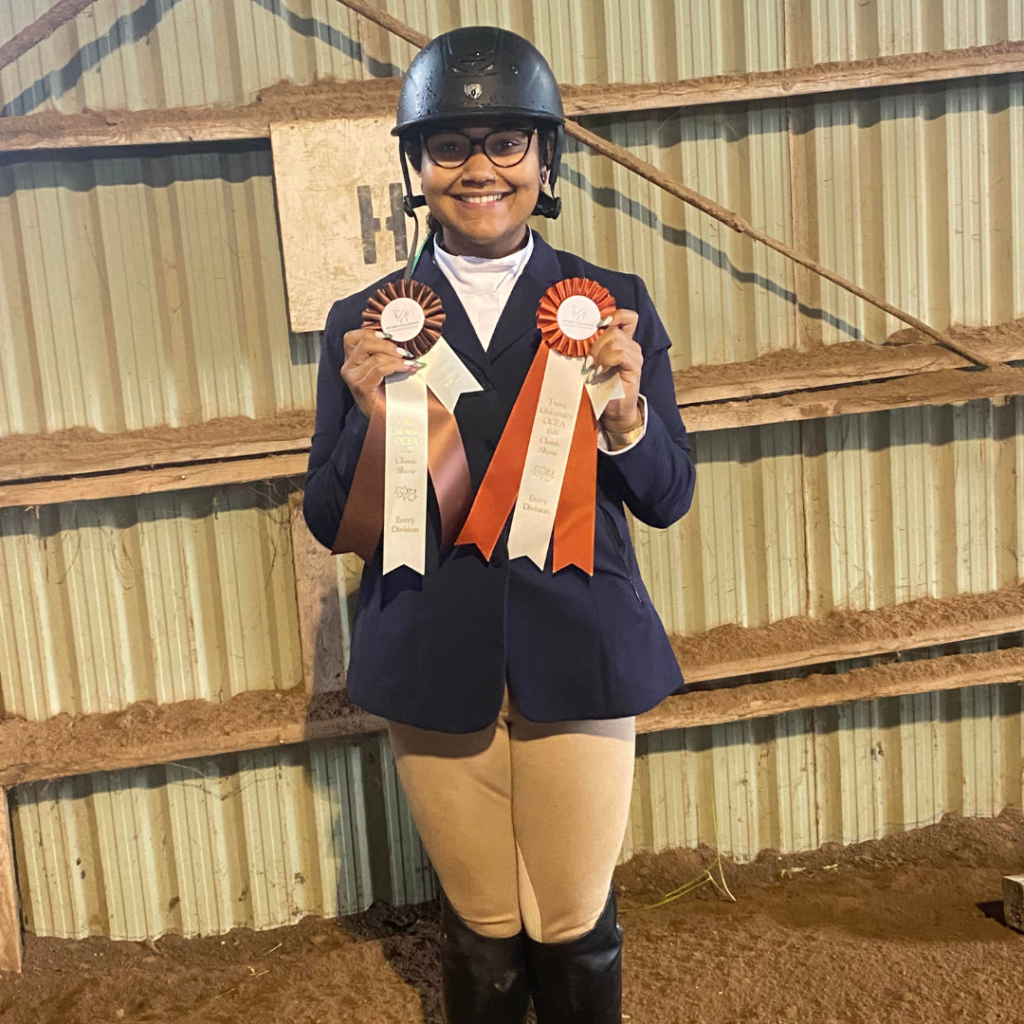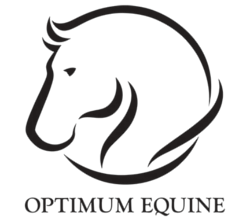
Holly is the Fall 2022 OYES Scholarship recipient.
I was first introduced to riding when I was eight years old by my grandmother. She began taking lessons in her fifties and decided to take me for trail rides and western lessons when I was younger. When I was 12, my parents enrolled me in English lessons as a Christmas present. As a young, mixed-race horse girl, I never saw girls that looked like me in Young Riders magazine or at my barn in South-Central Ontario. Not looking like other young equestrians caused me to feel isolated in a community I so desperately wanted to belong to. The following decade saw a decline in my kinship with horses. I stopped riding, gained weight, and gave up on the idea of me ever being able to jump a course.
In February of 2021, I enrolled myself in lessons to help keep me occupied during the lockdowns that Ontario faced. I had to start from the basics: relearning how to tack up, how to trot, and check my diagonals. Throughout 2021, I continued lessons multiple times a week with hunter-jumper coaches and achieved my childhood goal of jumping a course. Last year, I set a goal to try out for my university’s equestrian team, and I am proud to announce that I am the first Black athlete on my team and competed in my first show last month (placing fifth O/F and seventh U/S). My next short-term goal is to place fourth O/F and sixth U/S. I am not striving to be perfect – I am aiming to be better than I was the last time I sat in the saddle. I would love to be able to purchase a project horse and turn him into an eventer. It is my dream to get involved in cross country and fox hunting.
My equestrian interests aside, I am a fifth-year student at Trent University pursuing an Honours Bachelor of Science in Psychology and Women’s Studies. My career goal is to become a sex and relationship therapist for racialized, 2SLGBTQ+, neurodivergent, and disabled folks. One day, I hope to offer equine facilitated psychotherapy to youth in foster care and survivors of sexual violence. I am in the process of applying to graduate school for a Master’s in Counseling Psychology. I am confident that I will be able to achieve my career goal, as I have extensive experience as a peer supporter at Trent, a crisis text line responder for Kids Help Phone, and working with youth in care.
While completing school, I work two jobs to support myself. Contrary to the stereotype, I am not a wealthy equestrian. I come from a hard working family, and although we are middle class, I try not to depend on my parents to fund my hobbies. I am thankful for the government assistance that I receive for my tuition as it allows me to allocate my income to rent, bills, groceries, and my passion for horses. As a student, who relies on government funding and works two jobs, I am unable to invest in my riding career to the same degree as my teammates; all of whom have been showing since they were children. Sometimes, I worry that I am not a valid equestrian because I can only afford to take lessons once a week and I cannot afford a seasoned showjumper. I do not have the privilege of being able to spend all my free time riding because I need to remain financially stable.
The most impactful challenge that I have faced as a young, queer Black equestrian is that I still feel alone. I still don’t see girls who look like me with bodies and identities like mine. I initially was not offered a spot on the team, and I couldn’t help but worry that it was because I am a size 12 and Black. I was still obese when I started riding again, and I really felt inadequate and refused to have group lessons. I didn’t feel like I belonged. It is isolating when you enter the show ring and your last name is the only one that is not said aloud. It is disheartening when you see the other girls on your team braiding each other’s hair but no one offers to do yours. I am grateful for the girls outside of my team that I have met at my barn. They fight for me, and they advocate for me. They support me and believe in me, even when I don’t. What I love the most about riding is that the horses don’t care what color I am, or if I date women and trans folks – they care that I love and respect them.
If I am awarded the OYES Scholarship, I would utilize the funds for anticipated expenses for the winter portion of our show season. My team competes in the North Zone of the Ontario Collegiate Equestrian Association (OCEA). Our lessons are $55 each and we are expected to take lessons once a week for 11 weeks. Each show costs $105 to enter, and there are roughly two to three shows a semester. Many of these shows are over an hour away and require me to drive and may require me to stay overnight, depending on the show’s location. The barn that I have been riding at since September of 2021, Kildare Stables, is the same barn where my team is based. If I am in receipt of the scholarship, I will use the funds to pay for the remainder of my show season and lessons. This will alleviate the financial stress that comes with moving to a new city and commencing graduate studies. Since I have now only attended one show, I want to be able to attend as many more within the OCEA as possible so that I can hopefully lease and show on a larger provincial circuit (i.e., the Trillium Hunter Jumper Association).
I want to continue to show throughout my adulthood. Prior to my first show, I truly thought that I would never have an opportunity to show because I did not compete as a child. I do not care about placing first, or becoming a division champion – I care that I can continue to fuel my heart and soul with a passion my grandmother and I share. I also want to feel confident when I try out for my next university’s equestrian team, and I want to be able to upgrade to a higher division. My first show gave me so much confidence, and it was reaffirming to hear how well I did and how far I have come. Riding is also a positive and non-academic self-esteem booster, and I am so grateful for my grandmother who shared her love of horses with me.
